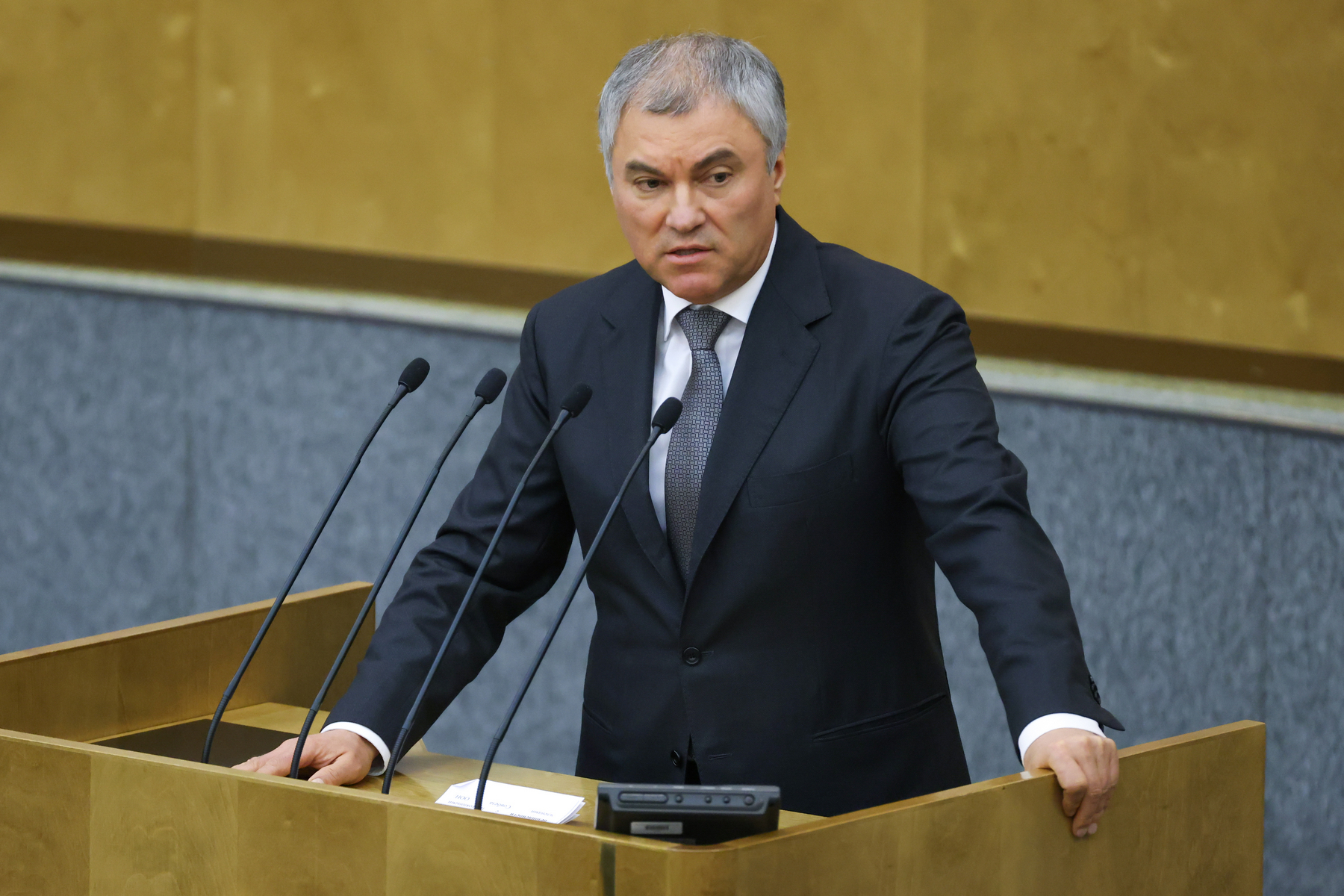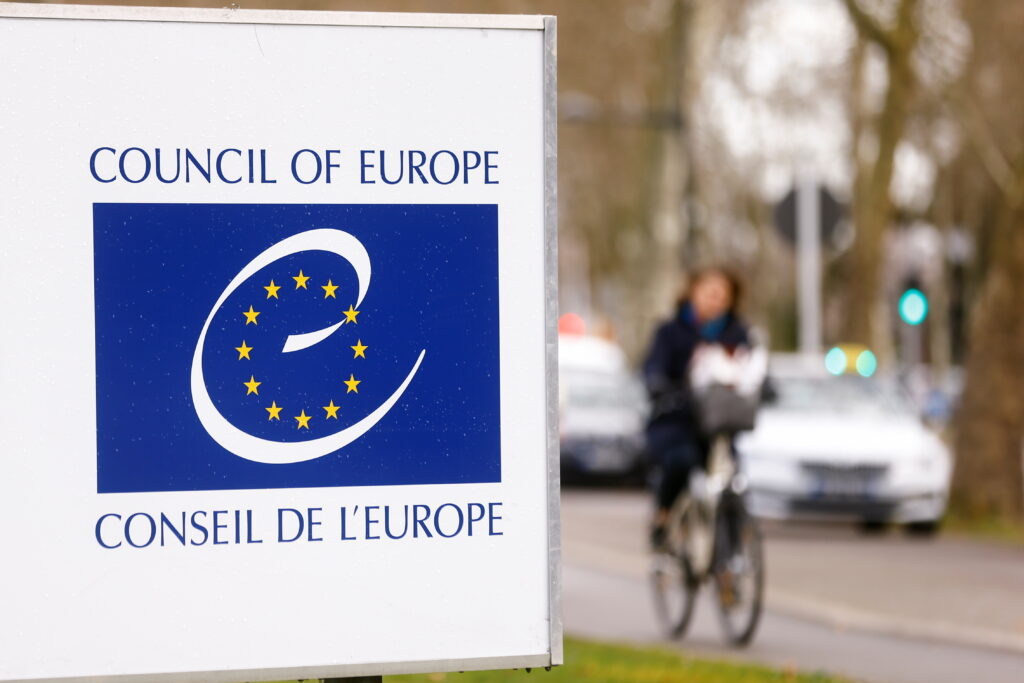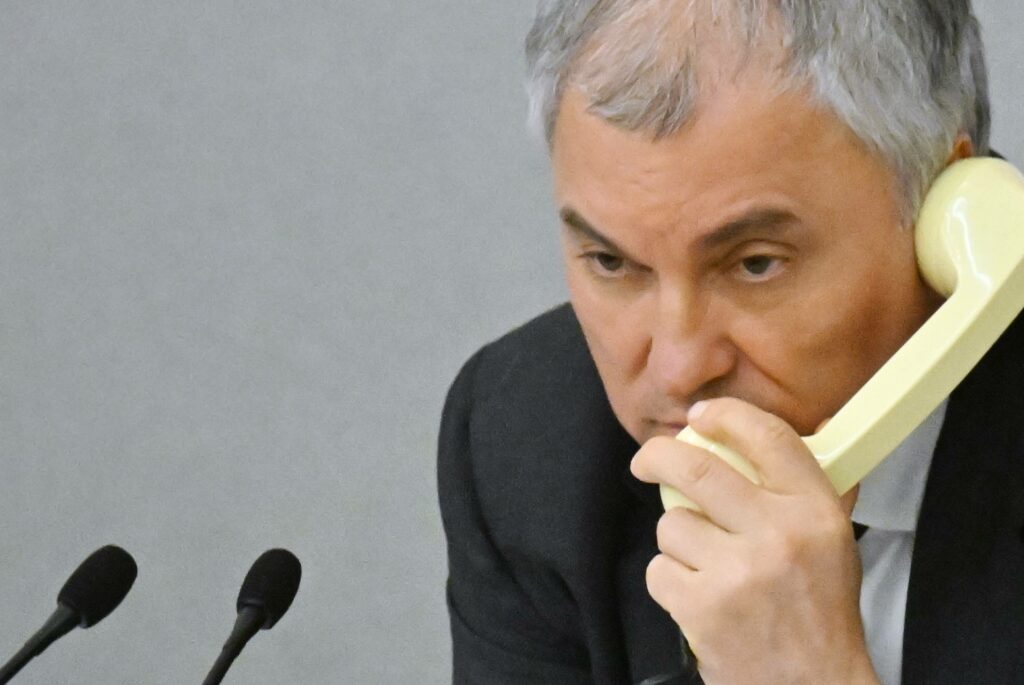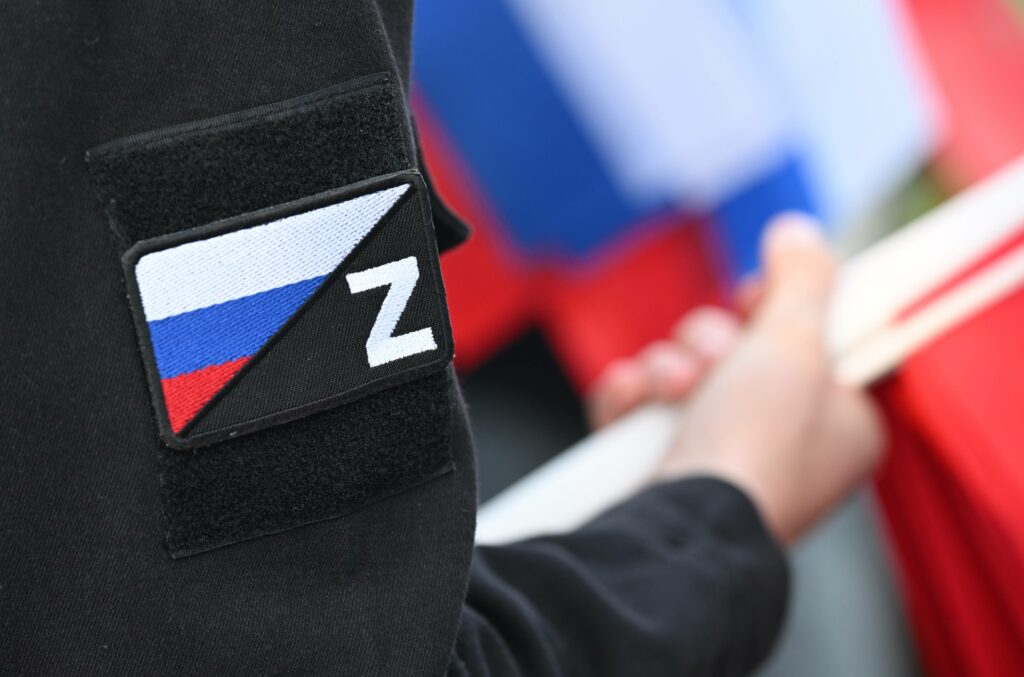After the outbreak of the war, the Russian parliament quickly went into the familiar but somewhat forgotten ‘mad printer’ mode. MPs are flooding the agenda with ideas: they want to ban signboards in foreign languages, tighten legislation on foreign agents and on the so-called ‘propaganda of homosexuality’. Duma Speaker Vyacheslav Volodin is keeping pace with them. He assigns a priority status to these initiatives and proposes innovations of his own, such as, for instance, a return to the educational traditions of Tsarist Russia. The Speaker is trying to turn the Duma into a bastion of internal conservatism and thus bring himself and the Duma to the attention of the war-focused president. At the moment, however, Vladimir Putin elevates those involved at the war front, while Volodin remains in the rear.
New prohibitions
The draft law banning the use of foreign languages on signboards in Russia was presented by Duma Speaker Vyacheslav Volodin in person in his Telegram channel on the eve of Russia Day. The document was authored by Elena Yampolskaya (United Russia), chairwoman of the Committee on Culture. «The bill seeks to combat the unjustified use of foreign words and phrases on signboards and in messages intended for consumers. The aim is to protect the Russian language and limit excessive use of foreign words in public space,» she explained.
Volodin did not only promote the initiative, but he also instructed the Deputy Speaker (also representing United Russia), Pyotr Tolstoy, who oversees the Committee on Culture, to ensure that the bill is examined as soon as possible. Tolstoy took up the task not only in the Duma apparatus, but also in public discourse.
«Those who cannot replace signboards immediately will be granted a grace period. Those who resist, will be forced to replace signs. Today, business freedom should not run counter to national interests. After all, the people of Russia are not just petty shopkeepers, and we all share the same Russian language. We will go on living with it,» he promised.
The ban on signboards is certainly not the only example of parliamentary activity in recent weeks. Vyacheslav Volodin forwarded the initiative undertaken by Sevastopol MPs to the Duma Council: it imposes penalties for ‘gay propaganda’ carried out not only among minors (this kind of legal provision already exists), but also among all Russian citizens. The law on ‘gay propaganda’ has a broad interpretation even today but if the new bill is passed, it would be interpreted even more widely. Judging by Russian practice, citizens could face fines for putting a rainbow on a T-shirt or a bag. The Duma intends to tighten the legislation on foreign agents. The main innovation of the bill, which already passed the first reading, is that Russians will be recognised as foreign agents not only when they receive foreign funding, but because of some kind of ‘influence’ from abroad. Moreover, foreign agents will not be able to engage in teaching or educational activities.
The chairman of the State Duma does not only sponsor high-profile initiatives focused on prohibitions, but also regularly makes public statements. For example, he proposes to retain capital punishment on the territory of the self-proclaimed Donbass National Republic (DNR).
The story of the ‘mad printer’
A torrent of prohibitionist, ultra-conservative initiatives and statements is now pouring out of the Russian parliament. The Duma already operated in this mode after the protests in Bolotnaya Square and Sakharov Square, earning the nickname of a ‘mad printer’. At that time, it adopted the first version of the law on foreign agents, banned foreigners from adopting children from Russia (the so-called Anti-Magnitsky Law or ‘Dima Yakovlev Law’), banned the promotion of homosexuality among minors, and increased penalties for high treason and participation in unauthorised rallies. The initiatives flowed from the Kremlin, which wanted to tighten the screws quickly and prevent a repetition of mass protests. But even then, the shrewdest MPs tried to ride this wave for their own benefit. The idea of banning foreign words came up already at that time, although it did not come from a high-profile United Russia politician (as is the case now), but from the leader of the Liberal Democratic Party of Russia Vladimir Zhirinovsky. Many of the initiatives were proposed by the MPs only verbally, but they created a buzz against the background of real activity. For example, Roman Khudyakov, a parliamentarian from the Liberal Democratic Party, proposed that the 100-rouble banknote should no longer feature the naked statue of Apollo, the ancient Greek god, which stands on the Bolshoi Theatre building. At the time, the media were full of headlines that read, «The Duma wants…,» followed by some very exotic ideas. In the context of the prohibitionist activity of the ‘mad printer’, readers considered these proposals to be fully serious.
At the time, the Duma went into the ‘mad printer mode’ for two main reasons. The Kremlin began to tighten the screws after the mass protest actions of 2011/2012 in Moscow and the regions. The second reason was that many deputies from the Communist Party of the Russian Federation (CPRF) and the Just Russia party, who had supported the protests and even repeated the protesters’ ideas from the Duma rostrum, began to show loyalty to the government after the opposition activity was suppressed. For example, Vadim Solovyov, now a former Duma member from the Communist Party, actively participated in the work-to-rule protest of parliamentarians, who used to disrupt the adoption of a law that would tighten the penalties for participation in rallies. After the protests across the country began to dry up, Solovyov started to come up with conservative PR initiatives: one of them was a proposal to restore the Soviet-style ‘artistic councils’ on TV.
The leaders of the new convocation of the 2016 Duma, headed by the former leader of the Kremlin’s internal political bloc Vyacheslav Volodin, were quick to disavow the image of a ‘mad printer’. Volodin imposed a strict discipline on attendance at sessions and promised to involve ‘leading universities’ as experts to review draft bills. Of course, the Duma did not refuse to adopt the Kremlin’s prohibitionist initiatives, but tried not to descend into a feverish, frantic mode: after all, Volodin cared about his political image.
Battles in the rear
It is now clear that Volodin is ruining the respectable image of parliament and, consequently, of its speaker, by re-launching the ‘mad printer’ mode. However, he is not doing it at the command of the president or his political bloc/administration, as the Speaker has long been in conflict with it.
The Duma is trying to look like a bastion of conservatism or even ultra-conservatism, a fortress that resists foreign influences. Volodin goes a long way to promote and support this image: he himself announces conservative ideas and emphasises his own role in promoting draft bills. The Duma Speaker does this in order to draw the Russian president’s attention to the parliament (and notably to himself). As an experienced czarist courtier, Volodin noticed long ago that Vladimir Putin likes crudest flattery. «No Putin, no Russia,» Volodin used to say while still working in the presidential administration, and he has repeated these words many times since. Volodin orchestrated an instant amendment, based on Valentina Tereshkova’s vote, to nullify Putin’s term of office in 2020. In 2022, he accurately guessed the president’s bellicose sentiments and quickly took up the Communist Party’s bill to recognise the independence of the Lugansk and Donbas National Republics (LNR and DNR), which had been considered marginal in early February. Soon after the start of the war, Volodin made frequent belligerent statements but quickly disappeared from the radar. Putin became embroiled in hostilities and then in the annexation of new territories to Russia thus, in fact, being constantly ‘at war’. Vyacheslav Volodin, on the other hand, became an armchair observer and commentator as there was no place for him ‘at war’.
However, Putin’s sentiments were recognised by other people from the ‘war party’: United Russia’s Secretary General Andrey Turchak began to frequent the front. The head of the Kremlin’s internal political bloc, Sergey Kiriyenko, began to travel to the DNR and LNR and will prepare plebiscites on the annexation of these territories. He also travelled to the Russian-occupied Kherson and Zaporozhye regions of Ukraine. Thus, Vyacheslav Volodin found himself in the rear of Putin’s wartime politics. This weakness of the Duma Speaker has been sensed by his opponents from the apparatus. For a long time, Volodin fought with Sergey Kiriyenko to gain control over United Russia, and then continued a fight with Turchak, who had already been appointed secretary of the UR General Council. The Duma Speaker attempted to attack United Russia members who were going to the front, criticising them for breaching parliamentary discipline.
«It seems to me that one should pay no attention to such statements and declarations made by a number of officials who are completely out of touch with reality. I have already said that only a person who was there on site can comment on this work. I was there and I absorbed it all. I didn’t stay seated in comfortable chairs,» Turchak replied harshly to Volodin.
According to the unspoken hierarchy, the Duma Speaker occupies a higher position than the Secretary General of United Russia, which means that Andrei Turchak has broken this hierarchy. However, he did not receive any criticism from the Kremlin for doing so, and this signal can be interpreted quite unambiguously: the country’s leaders are not standing up for Volodin, and he is weak.
This situation is clearly not satisfactory to Volodin and he is trying to get a feeling of his position and that of the parliament, which might be noticed by the president during the war. The Duma Speaker is among the people who are considered as potential successors to Vladimir Putin: a man who knows his goal, pursues it and is not going to give up easily. To achieve this, he must go to great lengths to remain in the president’s field of vision and continue to be seen as necessary. Most importantly, Volodin must remain an element of the system, with a role to play that is understandable under the new circumstances. Volodin makes the Duma a reliable stronghold for Putin in the rear, ready to tighten the screws as far as it takes, and to articulate things the president cannot or will not say because of his post. The Duma Speaker has taken up a hawkish stance and, in a sense, his new role is much more dangerous for critically-minded Russians than those of Dmitry Medvedev, the deputy chairman of the Security Council who is using harsh language in social networks, or of Sergei Kirienko, who is preparing the Donbass plebiscites. In fact, the laws passed by the newly activated ‘mad printer’ will directly affect their lives. The battle of hawks has begun to ruin Russia’s domestic life.










